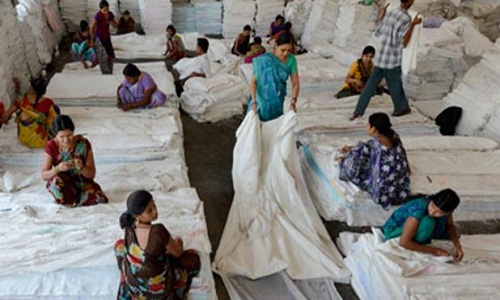"The adverse impact of demonetisation on disposable incomes and hence consumer spending has resulted in a slowdown in domestic demand for apparels and other end-products of textile industry in the immediate term. The resulting inventory accumulation with the retailers will, in turn, cause deferment of purchases from apparel/home-textile manufacturers (focussed on domestic market) in the near term, besides resulting in stretched payments. This, in turn, will affect the cash flow of the textile industry and is likely to drive a constraint in the demand for the entire textile value-chain, remarks leading research agency ICRA."

The adverse impact of demonetisation on disposable incomes and hence consumer spending has resulted in a slowdown in domestic demand for apparels and other end-products of textile industry in the immediate term. The resulting inventory accumulation with the retailers will, in turn, cause deferment of purchases from apparel/home-textile manufacturers (focussed on domestic market) in the near term, besides resulting in stretched payments. This, in turn, will affect the cash flow of the textile industry and is likely to drive a constraint in the demand for the entire textile value-chain, remarks leading research agency ICRA.

While textile retailers are facing the immediate impact, the impact on apparel manufacturers and other intermediaries in the value chain is expected to be felt with a lag of a few weeks, with reduction in orders due to a slower off take of the channel inventory. The overall impact on the sector, however, is expected to be limited as 1/3rd of the Indian textile industry is estimated to be export focussed (directly or indirectly). Also, as the demand reverts to a steady state over the next few months with expected improvement in liquidity, this impact will be neutralised.
Winter-wear segment to be worst-affected
In ICRA’s assessment, the impact of demonetisation is likely to be the most severe for winter-wear retailers and manufacturers focussed on the domestic market, who witness 60-70 per cent of their annual sales during the period October-February. Though from the manufacturers’ end, the shipments typically take place by September-October, pressure on sales in the retail space during the subsequent peak season can indirectly affect manufacturers. While on the one hand, slow sales increase the possibility of stock returns to manufacturers or affect order book for the next year in the light of unsold inventory; on the other hand, slow sales and consequent liquidity pressures on retailers can result in stretched payments to the manufacturers.
Cash crunch delays cotton arrivals
The harvest season for cotton in India begins in October, with major cotton arrivals happening till March. New cotton arrivals are typically accompanied by softening of cotton prices from the levels during the period April-September. While a similar trend was observed this year, announcement of demonetisation on November 8 has delayed cotton arrivals in the market due to widespread prevalence of cash payments to farmers. Accordingly, farmers are holding on to inventories resulting in a fall in daily cotton arrivals in November 2016 vis-à-vis corresponding previous, thereby resulting in artificial supply shortage and bottoming of cotton prices.
Short-term phenomenon, largely affecting the unorganised segment; yarn manufacturers to remain insulated In ICRA’s view, the slowdown in cotton arrivals and resultant marginal up-tick in cotton price post November 8, 2016 is a short-term phenomenon, which has already started to correct, as farmers have gradually started accepting alternate modes of payments. Further, the yarn manufacturers are expected to be insulated from this mismatch, given the sizeable inventory maintained by them on an ongoing basis.
The impact is expected to be pronounced on the unorganised segment, which forms a large part of the domestic textile sector where cash transactions are more prevalent, as reduction in currency circulation is likely to temporarily affect their routine business transactions.
Overall in ICRA’s view, the impact of the demonetisation is expected to be felt across the textile value chain in the near-term. While on the one hand, the impact is likely to trickle down from a slowdown in spending on apparels and other end products on the demand side; on the other hand, the reduction of currency in circulation is likely to adversely affect the unorganised segment and cotton procurement in the ongoing season of inventory build-up. Nevertheless, this is only expected to be a short-term phenomenon.












